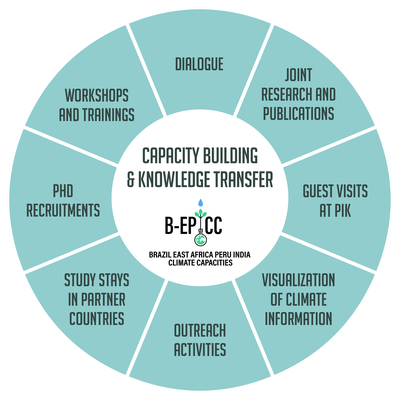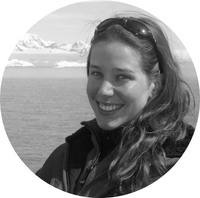Close cooperation with academia, research centers, policy makers, civil society and the business sector
This overarching objective of B-EPICC refers to the strengthening of national, regional and local capacities in order to adapt to the various weather and climate trends and risks in all partner countries. B-EPICC objectives require close collaboration between scientists (PIK, DWD, TERI and other scientific institutes, universities and meteorological services in the partner countries) as well as users (ministries, authorities, associations, civil society groups and commercial enterprises). This continuous process, also known as co-generation of relevant knowledge, is to be guided by the user in the need for information, whereas the results and products have to be adapted accordingly. Capacity building and climate services works through various means such as dialogues, workshops, trainings, study stays and guest expert visits, but also joint research, publications, visualizations and outreach. Last but not least: in line with creating an open-source platform that enables a strengthening of climate capacities for other regions too, the knowledge generated throughout the project will be distributed openly.

KNOWLEDGE BROKER
Capacity building and climate services is a two-way process. Co-generation of relevant information and products for climate adaptation (and mitigation), in the context of sustainable development, requires continuous dialogue between science and policy and decision makers. Therefore, the Knowledge Broker operates at the interface between science and practice and is responsible for the generation of relevant knowledge as well as its transfer from science to the application at the national, regional and local level (including feedback from practitioners to science for formulating relevant new research questions).
The starting point for matching information demand and supply is the respective national or local planning and management context, e.g. National Frameworks for Climate Services (NFCS), Nationally Determined Contributions (NDCs), National Adaptation Plans (NAPs), State Action Plans on Climate Change (SAPCC) water, agriculture and energy strategies and policies. In this context, proposed pathways and interventions need to be assessed and compared under different climate, land and water use and management scenarios.
Approaches and tools include this Knowledge Broker as interface between information supply and demand, employing for example multi-stakeholder knowledge and communication platforms and dialogue events, exchange visits and trainings, social media and smartphone apps, participatory scenario development, multi-loop learning.
Contact Person
Andrea Kambergs
Knowledge Broker
andrea.kambergs[at]pik-potsdam.de

VISUALIZATION
Visualization is the key technology for analyzing and communicating climate data. In order to better understand the user requirements in the target countries, we have carried out questionnaires with the B-EPICC user groups. The focus lies on the three groups (1) local scientists, (2) representatives of ministries and agencies and (3) climate impacted end users such as farmers. Based on these surveys, the tailor-made visualization solutions are provided to visualize both historic and future climate and climate impact results. We focus on visualization training courses for scientists, interactive web visualizations, and climate information solutions for end users.
Visualization of Climate Data for Peru, India, Tanzania, Ethiopia and Brazil
For the development of climate capacity in the five target countries, the team provides interactive climate data and information tailored to different stakeholder groups, using advanced visualization techniques. In addition, the research group develops visual exploration tools for scientists to improve the analysis of regional data sets on climate and climate impact data. The B-EPICC project is applying and improving interactive visualization techniques for the exploration and communication of heterogeneous water, agricultural and migration data. The visualizations are of various types, such as interactive maps, line charts, bar charts and scatter plots. These applications have been integrated for Peru, Tanzania and India in the existing web solution "ClimateImpactsOnline" in 2021. First, the web portal has been made available to local partners (such as the national meteorological services) and after a round of feedback it is now open to the general public. The next steps are now an integration of Ethiopia and Brazil, and an extension of the provided sector specific climate impact parameters.


About the “ClimateImpactsOnline” Web Portal
The "ClimateImpactsOnline" portal (http://kfo.pik-potsdam.de) is a result of research on climate impact for different sectors (agriculture, forestry, hydrology, energy and tourism) developed at the Potsdam Institute for Impact Research Climate (PIK). Within the portal, parameters such as temperature, crop yields or forest fire risk can be selected and displayed for various time periods. The selected parameters are shown as a color map and detailed representations can be accessed via three integrated zoom levels by clicking on selected regions. In addition, the portal provides teaching materials, background information and a glossary. PIK released the first version of the portal for Germany in 2013 and made available the versions for Peru, India and Tanzania by 2021. Meanwhile, the Sahel region and Central Asia are available as well. To be updated to the most recent developments, you can join the ClimateImpactsOnline mailing list.
Presentation "Visual Communication of Climate Data" recorded during EPICC Training in Lima, Peru, on the 22nd of November 2019
The video is accompanied by Spanish subtitles.
Contact Person
Dr. Thomas Nocke
Visualization
nocke[at]pik-potsdam.de

Scientific Advisors
Prof. Dr. Wolfgang Lucht
|
|
Dr. Maria A. Martin
|









